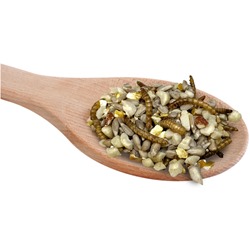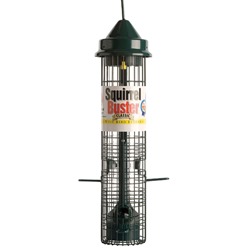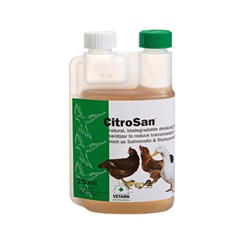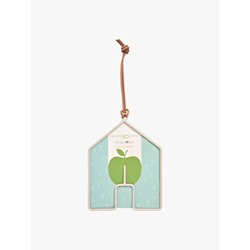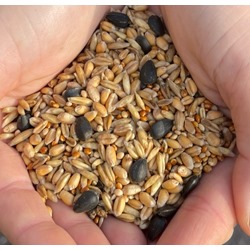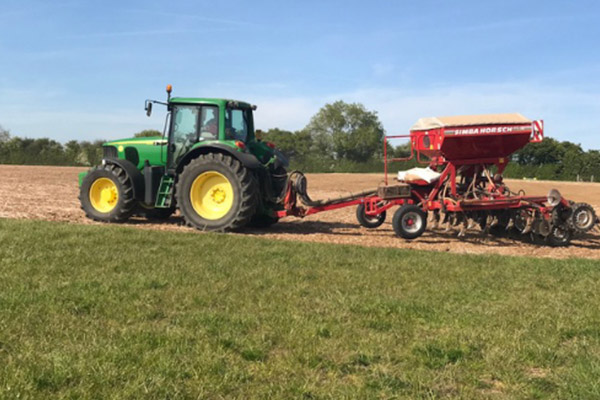
Richard finished spring planting yesterday, with the red millet going in well. The canary seed was planted about a month ago but has been struggling in the dry soil conditions.
The beans are looking strong, but they too need a good drink. Richard planted them deeper this year to help the roots find the moisture.
Planting the millet in these very dry conditions is a risk - the seeds need to be deep enough to find moisture, but not too deep or they won't grow at all!

We had a small amount of rain a week ago which really helped our spring barley to establish itself and to pick up its nitrogen from the soil. It is crucial that the barley picks up nitrogen now, so that when harvested the nitrogen content of the grain is not too high to allow it to be sold as malting barley for beer.
Our Winter wheats look really strong. We are finding that direct drilling with wider rows is allowing more sunlight to get to the lower leaves of the plant and they are looking much healthier as a result. Light is wonderful!
All our spring crops look in really good form and Richard is very pleased with our second year of direct drilling and the hugely positive impact it is having on the soil.
The Oilseed Rape Story

Steve Cook, our agronomist, very pleased with our rape!
Although our oilseed rape looks very strong and healthy this year, there is a possibility this may be our last year growing it. Flea beetle infestation of rape is now a major problem and in many parts of the country it is virtually impossible for farmers to establish a crop of rape. In badly affected areas, rape plants that have survived the Winter are being killed, or severely stunted by, in some cases between 40 and 70 flea beetle larvae emerging in the stem of each plant - it isn't possible to survive that! You may have noticed as you drive around the countryside, huge bare areas in fields that once would have been gloriously yellow; effects of the ravages of flea beetle and its larvae. So far, we are not badly affected, but that is probably because Richard has maintained a 1 in 7-year crop rotation for rape.

Cabbage Stem Flea Beetle

Larvae destroying a stem
Since the ban on neonicotinoid seed dressings came into effect (it was dusted on rape seed to repel the flea beetle) the farming industry is doing a lot of research into how to successfully establish a crop of rape in the presence of ever greater populations of flea beetle. Since rape is the third largest crop grown in the UK it is an important one, and solutions do need to be found.
The life cycle is below (here comes the technical bit!):

The adult flea beetles migrate in the last 10 days of August and the first week of September from the soil onto newly sown rape plants. So if they hit the new plants hard at that time, the plants will not establish = no rape grown. The most important thing, therefore, is for the new plants to be strong and established before they are hit (like padding up before the punch). A number of things may help:
- Genetics - focus on breeding fast establishing plants
- Good soil moisture at planting will help fast growth - so direct drilling could benefit
- Longer rotations - no volunteers in the ground acting as food for the flea beetles
- Companion Cropping - using companion crops like mustard and vetch as a decoy for the flea beetle. A neat idea but having varied success at the moment.
To try to limit the spread of the beetle in August/September time, leaving the rape stubbles alone will help. If farmers cultivate rape stubbles early, there is a greater risk of flea beetles moving from their fields to a neighbouring, newly-sown rape. Perhaps farmers everywhere should be working more collaboratively to help solve this major problem?
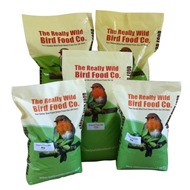
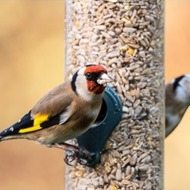 Back
Back Bird Feeders
Bird Feeders  Seed Feeders
Seed Feeders Peanut Feeders
Peanut Feeders Peanut Butter Feeders
Peanut Butter Feeders Suet & Fat Feeders
Suet & Fat Feeders Window Feeders
Window Feeders Hanging Feeders
Hanging Feeders Feeding Stations
Feeding Stations Ground Feeders
Ground Feeders Easy Clean Feeders
Easy Clean Feeders Bird Tables
Bird Tables Seed Trays
Seed Trays Bird Baths & Drinkers
Bird Baths & Drinkers Feeder Accessories
Feeder Accessories Feeder Hygiene
Feeder Hygiene Squirrel Proof Bird Feeders
Squirrel Proof Bird Feeders For the Kids
For the Kids Niger Seed Feeders
Niger Seed Feeders Mealworm Feeders
Mealworm Feeders Bird Food Storage
Bird Food Storage Fat Ball Feeders
Fat Ball Feeders Tube Feeders
Tube Feeders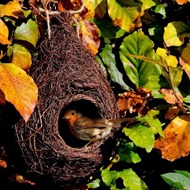



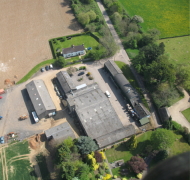 Our Farm
Our Farm Contact Us















